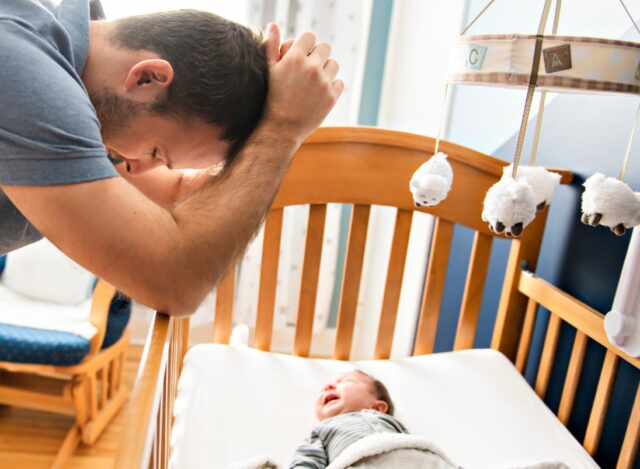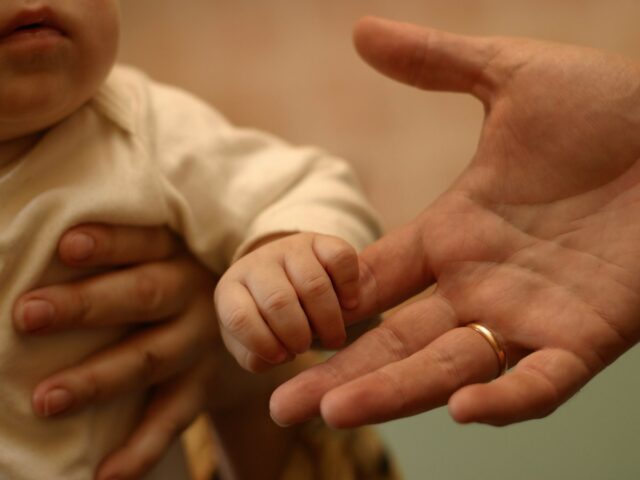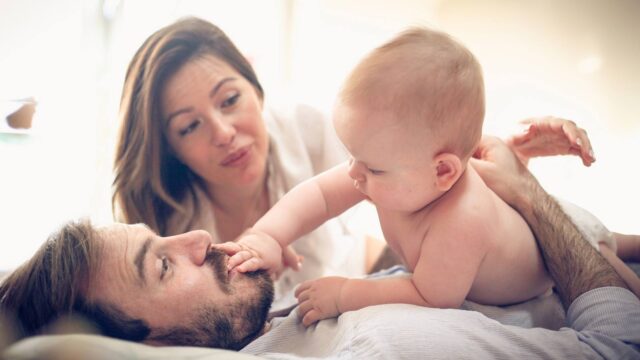
Researchers have been studying postpartum depression in women for more than 50 years. Postpartum depression in men, on the other hand, seems about as real as a mythical creature. Many people have never even heard the term “postnatal” or “postpartum” depression applied to dads. In fact, a study in 2019 at the University of Nevada, Las Vegas, published in the Journal of Family Issues, found that: many fathers did not know they could get postpartum depression and were surprised to learn others got it, and many mothers did not know what to call it when they saw it in their partners.
Yet “paternal postpartum depression” (PPD) is a real phenomenon and more common than one might think. Researchers say the prevalence of depression in dads during the first two months postpartum has been as high as 25 percent. A May 2019 study in the journal Innovations in Clinical Neuroscience found that postpartum depression occurs in 8-10 percent of men—and that it is most prevalent during the 3-6 months after birth.
What Is Paternal Postpartum Depression?

PPD is defined as an incident of major depressive disorder that occurs soon after or within the first year after the birth of a child. (Learn how treatment at FHE Health is helping people with major depressive disorder and other types of depression manage their symptoms and achieve a better quality of life.)
As is the case with women, postpartum depression in men can be serious and life-threatening. Depression is a key risk factor for suicide, which occurs in men four times as often as in women. (Experts say one reason for this much higher prevalence of suicide in men is that men are less likely to ask for help when depressed, presumably because of social stereotypes about “manliness” that imply that “real men” don’t ask for help.)
5 Key Things to Know About PPD

Because PPD is both real and potentially life-threatening, more dads and couples need to know about it. Here are five important things to know:
1. Who is more at risk of developing PPD
First-time and younger fathers have a higher risk of developing PPD. The new stresses, anxieties and uncertainties of becoming a parent can be triggers.
Interestingly, the risk of PPD goes up significantly for men whose partners are suffering from postpartum depression.
Other factors can raise one’s risks as well, such as a family history of anxiety and/or depression, marital discord, poverty, hormonal changes and/or unintended pregnancy.
2. PPD often goes undiagnosed

Postpartum depression can often get missed in men. One reason is that many people don’t realize that men can get it.
Another reason for the misdiagnosis of PPD is that the symptoms in men can look different than they do in women. For example, whereas a woman might cry a lot and be despondent, a man might become frustrated, irritable, cynical and/or angry. Here are some of the other postpartum depression symptoms that tend to occur more in men than in women:
- Indecisiveness
- Withdrawal from family/work/life/social situations
- Conflict
- Negative parenting behaviors
- Substance abuse
- Physical symptoms like indigestion, diarrhea, constipation, headaches, toothaches
- and nausea
PPD can also come on more gradually in men, with the result that the symptoms may be easier to minimize or misread as something else.
Adjusting to parenthood can be stressful, after all. Many of the symptoms of PPD can be dismissed as a manifestation of this stress, whether because of the greater financial responsibilities, changes in schedule, loss of sleep and/or other factors. Some of the symptoms of PPD that can easily be misread as a normal part of the adjustment to parenthood include:
- Sad or down mood
- Fatigue
- A loss of energy
- Weight gain or weight loss
- Concentration problems
3. When to get help

If any of these symptoms begin to interfere with daily life and functioning, it may be time to get help. Sometimes, there may be other more obvious signs that it’s time to seek help. Feelings of guilt or worthlessness or a loss of interest or pleasure in activities that once were fun may be a warning sign of major depression.
More urgently, recurring thoughts of death or suicide should be an immediate cue to seek medical help. The fact is that even a suspicion of major depression means it is time to seek help.
4. How to get help
Many men may not know how to get help for the very same reason that PPD can easily go undiagnosed: They do not know they could have a real disorder that can be medically treated. Yet an episode of major depression (a defining mark of PPD) is a medical condition that can be treated effectively with medication and therapy.
A visit to one’s primary doctor or, better, a psychiatrist, is a good place to start. If repetitive thoughts of self-harm are causing distress, go to the nearest emergency room.
Or, consider getting assessed by an inpatient mental health treatment provider. A clinical assessment by medical professionals can provide an accurate diagnosis and help to determine whether inpatient or outpatient treatment may be the best course of treatment. (When a person’s depression has become so debilitating that they are not able to fulfill basic daily functions or are in danger of taking their own life, inpatient treatment is the better route.)
5. Dad’s health is important, too

So much of the focus during pregnancy and afterward is about the health of the mother and her baby—as it should be. It is critical that expecting mothers feel as healthy and supported as possible.
While this emphasis is important, let’s not forget dads in the process. Fathers need to feel as healthy and supported as possible, too. They face many of the same worries that make women vulnerable to postpartum depression. Whether it’s changes in relationship dynamics, a lack of sleep, or worries about money, multiple risk factors can trigger depression at a time that is typically associated with joyfulness: the birth of a child. Even guilt over not feeling more joyous can contribute to depressive symptoms.
When more people know about PPD, understand that it’s real, and have the information and education they need to be able to recognize it and get help, that is a step in the right direction.
The article is provided by Dr. Michael Jochananov, Psy.D., who is the director of the mental health program at the national behavioral health provider FHE Health.








